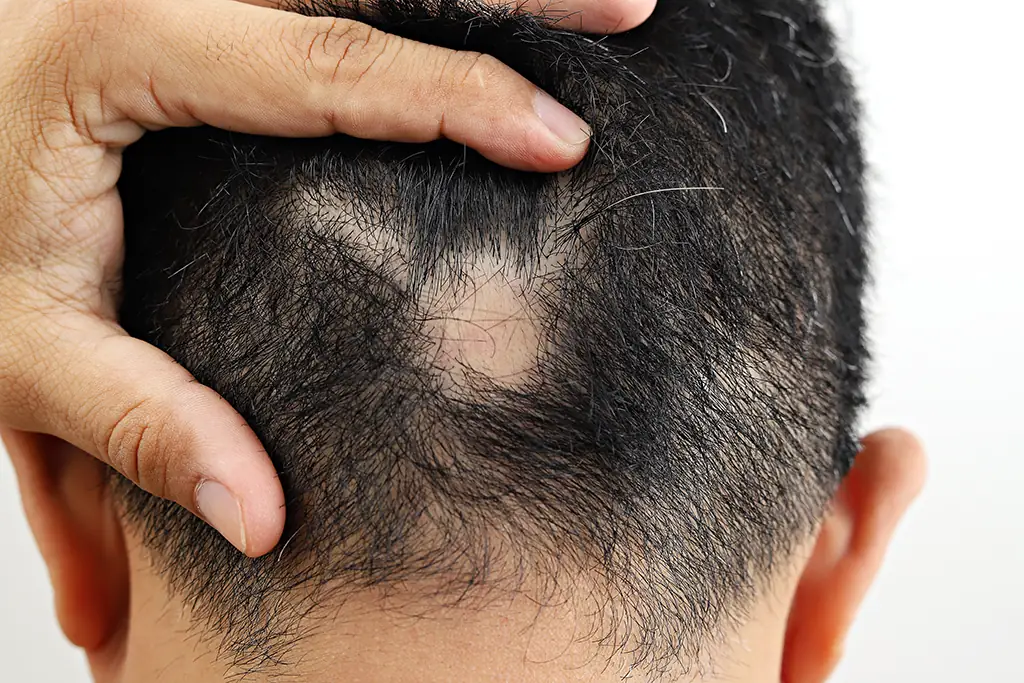Are you wondering can food allergies cause hair loss and searching for clear answers? While food allergies don’t usually cause baldness directly, they can trigger inflammation, immune reactions, or nutrient deficiencies that affect your scalp and hair health.
This article explains the science behind the allergy–hair loss connection, how to diagnose it, and what treatment options can help. Backed by expert insights and real-world cases, you’ll learn actionable steps to protect your hair and overall well-being.
What Do We Mean by ‘Food Allergies’ vs. Intolerances?

Before exploring the link to hair loss, it’s important to clarify terms often used interchangeably.
Food Allergy
- An immune system reaction to specific proteins in foods (e.g., peanuts, sesame, shellfish).
- Even small amounts can trigger hives, swelling, difficulty breathing, or anaphylaxis.
- Chronic exposure may cause ongoing inflammation in the body.
Food Intolerance
- Non-immune reaction, often involving digestion (e.g., lactose intolerance).
- Symptoms include bloating, stomach upset, or fatigue, but rarely direct immune-related scalp effects.
Gluten & Celiac Disease
- Gluten sensitivity and celiac disease are autoimmune conditions, not just allergies.
- In celiac disease, gluten exposure can damage the gut and cause nutritional deficiencies that lead to hair thinning.
Common triggers linked with both allergies and hair concerns include: sesame, wheat/gluten, dairy, soy, and shellfish.
How Can Food Allergies Indirectly Cause Hair Loss?
Food allergies rarely cause hair loss as a single direct effect. However, they may create conditions in the body that weaken hair follicles.
Nutritional Deficiencies Due to Food Avoidance
When people cut out entire food groups to avoid allergens, they risk losing essential nutrients for hair growth:
- Iron – essential for oxygen delivery to hair follicles.
- Protein – the building block of keratin (hair structure).
- Vitamin D – linked to healthy follicle cycling.
- Biotin (Vitamin B7) – crucial for hair strength and growth.
Example: Someone avoiding dairy may miss calcium and vitamin D unless supplemented.
Inflammation & Immune Response
- Allergic reactions trigger histamine release and immune activity, which may cause scalp inflammation.
- Chronic inflammation can push hair follicles into the “resting” (telogen) phase, leading to shedding.
- In some cases, food allergies overlap with autoimmune conditions such as alopecia areata.
Evidence from Research & Clinical Observations
While studies are limited, growing research shows a connection between food allergies and hair disorders.
Atopy and Alopecia Areata
- People with atopic conditions (allergies, asthma, eczema) show higher rates of alopecia areata.
- Food allergy appears as a comorbidity in some alopecia cases.

Sesame Allergy Case Studies
- Children with sesame allergy experienced patchy hair loss.
- Once sesame was removed from their diets, hair regrowth improved significantly.
Gluten & Celiac Disease
- Some individuals with celiac disease experience diffuse thinning or alopecia areata.
- Following a strict gluten-free diet sometimes reverses hair loss, though results vary.
How to Diagnose the Link Between Food Allergies and Hair Loss
If you suspect your hair loss is linked to food, a structured approach is crucial.
Step 1: Specialist Consultation
- Start with a dermatologist or trichologist for scalp analysis.
- Allergy testing may be recommended with an allergist.
Step 2: Elimination Diet
- Temporarily remove suspected allergens (e.g., gluten, dairy, sesame).
- Reintroduce one at a time under medical supervision to confirm triggers.
Step 3: Diagnostic Tests
- Blood tests for IgE (allergy markers).
- Nutrient panels for iron, vitamin D, B12, and zinc.
- Patch testing for delayed food or chemical sensitivity.
Treatment & Management Strategies
1. Allergen Avoidance + Balanced Nutrition
- Remove confirmed allergens while ensuring dietary substitutes.
- Example: Switch from dairy to fortified non-dairy milk for calcium and vitamin D.
2. Supplements Under Medical Supervision
- Iron, biotin, and vitamin D may be prescribed if deficiencies are found.
- Avoid self-supplementation; excessive intake can also cause hair loss.
3. Managing Autoimmune-Related Hair Loss
- Treatments for alopecia areata may include corticosteroid injections, immunotherapy, or new biologic drugs.
- Addressing food allergies alongside these treatments can enhance outcomes.
4. Anti-Inflammatory Diet & Lifestyle
- Focus on omega-3 fatty acids, leafy greens, whole grains, and antioxidant-rich foods.
- Reduce processed foods, sugars, and excess alcohol.
- Stress management (yoga, meditation) supports overall immune balance.
Pro Tip: Keep a “hair diary” tracking diet, allergy symptoms, and shedding patterns. This helps your doctor identify patterns.

FAQs: Can Food Allergies Cause Hair Loss?
1. Can food allergies directly cause hair loss?
Not directly. They cause inflammation or nutrient imbalances that may contribute to shedding.
2. What foods are most commonly linked to hair health issues?
Sesame, gluten, dairy, and soy are the most studied.
3. Can gluten sensitivity cause hair thinning?
Yes, especially in celiac disease, where nutrient absorption is impaired.
4. Is hair loss reversible after fixing a food allergy?
Often, yes. If inflammation and nutrient issues are resolved, follicles may recover.
5. How long before hair improves after dietary changes?
Typically 3–6 months, depending on severity and follicle health.
6. When should I see a specialist?
If hair loss persists longer than 3 months or is rapidly worsening.
Next Step
If you’re struggling with unexplained hair loss and suspect food allergies may be involved, don’t wait for the problem to worsen.
Book a consultation with Dr. Rana Irfan in Islamabad today to receive a professional diagnosis, personalized treatment plan, and long-term solutions for restoring your hair health.
